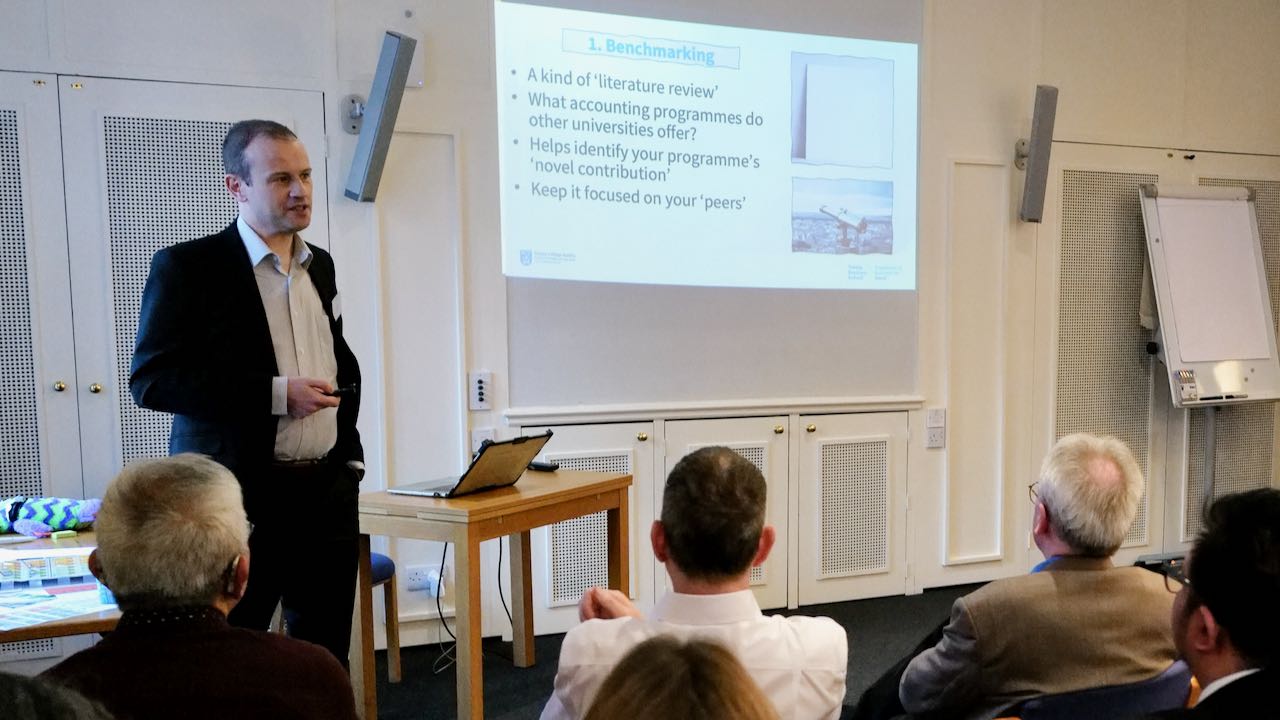Exit your comfort zone: five tips for new Programme Managers
Posted by Neil Dunne. Last updated: March 21, 2024
Dr Neil Dunne shares five tips for prospective or new programme managers within academia. Every university differs, but Neil’s advice is transferrable across institutional and geographical boundaries.

Photo by Toby York
Introduction: a sudden jolt
Picture the scene: you’ve just completed your first year of teaching at a great university. It was tough. But so are you. You prepared assiduously, presented with style, wrote great exams, and achieved strong student evaluations. Bring on next year! And then . . . an email arrives from your Head of Department:
“Congrats again on those teaching evaluations! We now want to launch a new accounting programme. And you are just the person to lead this project!”
Doubts flood in. How does anyone write a new programme, let alone manage it? Where will I find lecturers? What if we get no students? Can I please just stick to teaching?
Let’s not panic! In this article, I share five tips for programme managers that I have learned over the years. My experience pertains to a postgraduate programme [Note 1], but the advice can easily be tailored to undergraduate or executive education.
Let’s begin . . .
Tip 1: Benchmarking
So, you are facing a blank screen, wondering how on earth to write a new programme. Well, just as a research project starts with a literature review, let’s see what is already ‘out there.’ In other words, what accounting programmes do other universities offer?
To continue the research analogy, what is the landscape into which you plan to make a ‘novel contribution’? This scoping exercise helps you create a programme sufficiently connected to the existing marketplace but also offering something particular that other programmes do not.
To avoid saturation, keep it focused — think about who your ‘peers’ are and limit your analysis to them. The analysis can entail both desk-based (e.g., online searches) and field-based (e.g., discussions with colleagues in your institution and elsewhere regarding what ‘works’ and what doesn’t when it comes to programme design) elements. Summarise your findings in a simple spreadsheet, using headings such as: University, Programme Name, Modules, Capstone (e.g., dissertation, company project etc), Accreditation, and Website. After doing this, you will have a sense of what the landscape is like. Now, it is up to you to build a programme that ‘fits’ within this landscape but is also unique to your institution.
Tip 2: Teamworking
Whereas teaching can resemble a sole-trader type activity, programme management requires and rewards teamwork, collaboration and communication, especially in the early, pre-launch days of a programme. You will find yourself liaising with colleagues you may barely know. Remember, they are there to help you, so reach out!
For instance, your institution’s marketing and admissions department can advise on student demand for your proposed new programme. Your careers team will have employability resources for students.
Of course, teamwork works both ways, and these non-accounting colleagues will require your ‘subject expertise’ to advise them on accounting-specific issues. For instance, the marketing strategy used to attract management students may not necessarily transfer to an accounting programme, and they will need your guidance on promotional material. At this point, you may notice that much of what you take for granted, e.g., the difference between ACA, ACCA, CPA and CIMA, or the nuances of industry vs practice, is not common knowledge, so there will definitely be some two-way learning involved here.
Teamworking also applies to students. In particular, once the programme gets started, make sure to appoint class representatives and meet them regularly (every couple of weeks is a good rule of thumb). Class reps are an invaluable ‘bridge’ between a programme manager and the students, and I urge you to treat them as teammates and allies.
Finally, moving beyond your institution, liaise with the professional accountancy bodies. Communicate with them regularly — knowledge of how they are developing their curricula will be invaluable as your own programme evolves.
Tip 3: Staffing
Now we need to consider: who shall teach on our new programme? This is a critical decision, as lecturers are the first line of contact with students. The first point to note here is that the level of ‘choice’ involved will vary from university to university, and from programme to programme. In some cases, you may be allocated lecturers, whereas in others, programme managers have extensive autonomy in selecting faculty. Regardless, we must ensure that we have a ‘vision’ for our programme that all colleagues, whether allocated or chosen, can buy into and work towards. A sense of purpose and vision, for instance what do we want our ‘ideal’ graduates to be capable of, helps guide our decisions, and also helps us communicate the rationale for these decisions to all colleagues.
Of course, potential lecturers must be able to teach in a manner that engages and inspires students. One way of assessing this is the use of ‘mock’ lectures. However, an equally important requirement is the ability to write exams that adequately assess learning outcomes at the appropriate level. It is assessment that students remember, and it is assessment that professional accountancy bodies accredit. So, although teaching is critical, you should also inquire as to the exam-setting experience of potential faculty.
Depending on autonomy over staffing autonomy, you will also face choices regarding whether to include full-time colleagues or part-time faculty. Full-time colleagues are obviously more ‘permanent’ than part-time (adjunct) lecturers, but they may lack the ‘real-world’ experience that part-time colleagues bring and may be required on other programmes in your institution. Part-time faculty can bring authentic real-world perspective, but may lack experience, or may be only experienced in related but different contexts, for instance professional accountancy education.
Even if your choice is constrained, the important thing is to treat all faculty equally and with respect, whether full-time or part-time, and strive to nurture a sense of community to the extent possible, for instance via social events, training and (efficient) meetings. Finally, although it may go without saying, it is recommended that you actually teach on the programme you manage. Being in the classroom with students is an invaluable way of getting to know the class better and identifying issues before they escalate.
Tip 4: Marketing
Now, we reach an area that I personally found daunting, namely ‘selling’ the programme. This could involve, for example, authoring/reviewing promotional articles, website content, or, in the area I initially found quite surreal, YouTube videos. Now, in one sense, making such videos is just another ‘performance’ (much like lecturing), so what’s the big deal, right? But there are key differences between discussing technical material to a ‘captive’ student audience, and actively ‘selling’ a product to geographically distant potential students. That said, don’t abandon the skills that make you a great teacher. Be warm, be yourself, and prepare!
You may not think you have the skills or personality to ‘sell’ something, but here I would direct you to the concept of ‘free trait theory’ (e.g., Little, 2008), whereby we can act ‘out of character’ in the service of a project (i.e., our programme) that we are passionate about. When it comes to a ‘project’ that I am passionate about and invested in, somehow it all clicks, and my genuine enthusiasm overrides any fears!
Tip 5: Listening
Finally, remember that being programme manager doesn’t mean that you have to have all the answers. Surround yourself with good people, or, as I put it, people you don’t need to worry about! Rather than sending out lengthy email proclamations, try to listen to others, whether that be disgruntled colleagues, accreditation agencies, students etc. Often, all that other people want is the chance to vent, and programme management sometimes mean that you are the recipient. And finally, although you will need to have a programme-level ‘vision’, listen to lecturers who are subject specialists. Everyone has a unique experience and something valuable to contribute. Try to provide calm and authoritative leadership, yet remain sufficiently humble to allow all voices to be heard.
Conclusion
Programme management requires a set of skills, some of which are complementary to teaching, and some of which are new. Don’t discard the approach and skills that make you a great teacher. Instead, adopting a growth perspective, try to ally those skills with some of these tips, and remember that you don’t need to have all the answers. It can be a tricky role, but one that is ultimately rewarding, as testified by the 100’s of students that have graduated from ‘my’ programme into the accounting profession since that first day of staring at a blank screen!
About the author

Dr Neil Dunne is Assistant Professor in Accounting at Trinity College Dublin and Programme Director of Trinity Business School’s Postgraduate Diploma in Accounting.
Useful resources and references
^ Note 1: Postgraduate Diploma in Accounting at Trinity Business School.
^ Note 2: Little, B. R. (2008), Personal projects and free traits: Personality and motivation reconsidered, Social and Personality Psychology Compass, Vol. 2 No. 3, pp. 1235-1254. Available at: https://www.brianrlittle.com/articles/%EF%BF%BCpersonal-projects-and-free-traits/ (Accessed 21 March 2024)
© AccountingCafe.org



